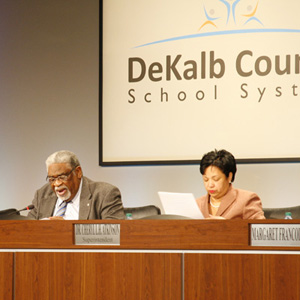 The threat of losing accreditation has jolted one of the nation’s largest school systems, as school board members in DeKalb County, Ga., scramble to save their jobs. The school board filed suit Tuesday to halt a state hearing that could result in the governor removing them from office. The state Board of Education is scheduled to meet Thursday morning.
The threat of losing accreditation has jolted one of the nation’s largest school systems, as school board members in DeKalb County, Ga., scramble to save their jobs. The school board filed suit Tuesday to halt a state hearing that could result in the governor removing them from office. The state Board of Education is scheduled to meet Thursday morning.
The crisis in DeKalb began in December when the Southern Association of Colleges and Schools (SACS) placed the school system on probation. In a scathing report, SACS said the “extreme dysfunction” of the DeKalb Board of Education, just outside Atlanta, was having a “devastating impact” on the quality of education in that school system
Accreditation doesn’t affect federal school funding, student aid or most college admissions. But as reported in the January issue of Youth Today, AdvancED, parent company of three of the nation’s six accrediting agencies, has targeted school board governance, particularly in the South, as a key part of its mission to improve the quality of education.
SACS has cited at least 17 districts in the past five years for school board infighting and mismanagement. AdvancED accredits 1,300 school districts and 23,000 schools in 37 states, which gives it tremendous influence in U.S. education. Its actions are closely watched by other school districts.
The Atlanta region still has painful memories from a previous SACS action. When Clayton County, south of Atlanta, lost accreditation in 2008, about 3,400 students left the system and local housing values slumped.
Georgia law now gives the state the power to intervene. Although SACS is a private agency, placing a Georgia district on probation triggers a hearing before the state Board of Education, which can recommend whether the governor should remove the locally-elected school board members. Last year, Georgia Gov. Nathan Deal replaced the school board in Miller County, a 1,100-student district in southeast Georgia.
The stakes are much higher for DeKalb, which has almost 99,000 students. “If the third-largest school system in this state, a metro system in Atlanta, loses accreditation, we have just killed economic development in the region,” said state Sen. Fran Millar (R-Dunwoody), who said he would personally advise the governor to replace the board.
“If there’s no action, I don’t see any way for this board to get its act together. I’m not optimistic at all,” he said.
In the short run, the state intervention has added to the turmoil in DeKalb, where board members vow to make improvements. They appeared before the state Board of Education on Jan. 17 and asked for three months to show progress on the SACS complaints. The state board showed little patience and postponed the hearing for only 30 days. It will resume on Feb. 21.
Meanwhile, the superintendent stepped down in what was called a mutual agreement with the board. Board chair Eugene Walker relinquished his leadership post, although he remains on the board. The board hired former Georgia labor commissioner and political insider Michael Thurmond to steward the system as interim superintendent and hired a law firm to help with governance training.
SACS accused the board of micromanaging, nepotism, financial mismanagement, lack of professionalism and unethical conduct. While Walker said he didn’t agree with some of the criticisms, he said the board is committed to complying with the SACS recommendations for improvement.
But before they work with SACS, board members must make their case to the state. “We’ve got to convince the state school board that we are exerting good effort and sincerity in what we’re doing,” Walker said.
The turmoil in DeKalb once again highlights the question of whether school board reform should occur through the ballot box or be shepherded by a third party, such as a private, non-profit education agency. Ironically, three of the nine members of the DeKalb board are new; two of them unseated incumbents in the November election, and one won a vacated seat.
“As much as I think we have issues on the board and we would be better off if they were replaced, you have to ask yourself, ‘Who will the new appointees be?’” said Don McChesney, a retired DeKalb teacher and former board member who was unseated in the last election. “They will be political appointments, won’t they? Whose agenda are they going to represent? Is that the governor’s or the people of DeKalb County?”
McChesney also said the SACS report contains errors and misinterpretations of events. He asserted that the accrediting agency has a bias toward “educrats” – the administrators. “SACS is there to perpetuate the superintendents and staffs of central offices, no matter what. You think they’re looking after Johnny’s academic progress? Well, they’re not,” he said.
The DeKalb NAACP accused SACS of singling out majority-black school systems for the harshest accreditation sanctions. “We are aware of schools in Georgia that have had similar kinds of problems. They don’t put as much pressure on the school system. They get in there and work with them and make sure things are right,” said John Evans, president of the DeKalb NAACP.
Whatever the fate of the school board, the system itself has taken a heavy blow to its reputation. Two petitions on change.org asking the governor to replace the board have garnered about more than 1,000 signatures each.
“That’s what we’re suffering from more than anything, the rumors that people want to hear that make good sound bites,” said board chair Walker. “DeKalb County is a very good school system, and the record will show that. Young people are not suffering from coming to our schools. Those are the facts.”
Still, the county has pressing concerns academically. The district’s graduation rate in 2010-2011 was just 58.7 percent, which is below the statewide rate of 67.5 percent. Georgia has one of the lowest graduation rates in the country.






























